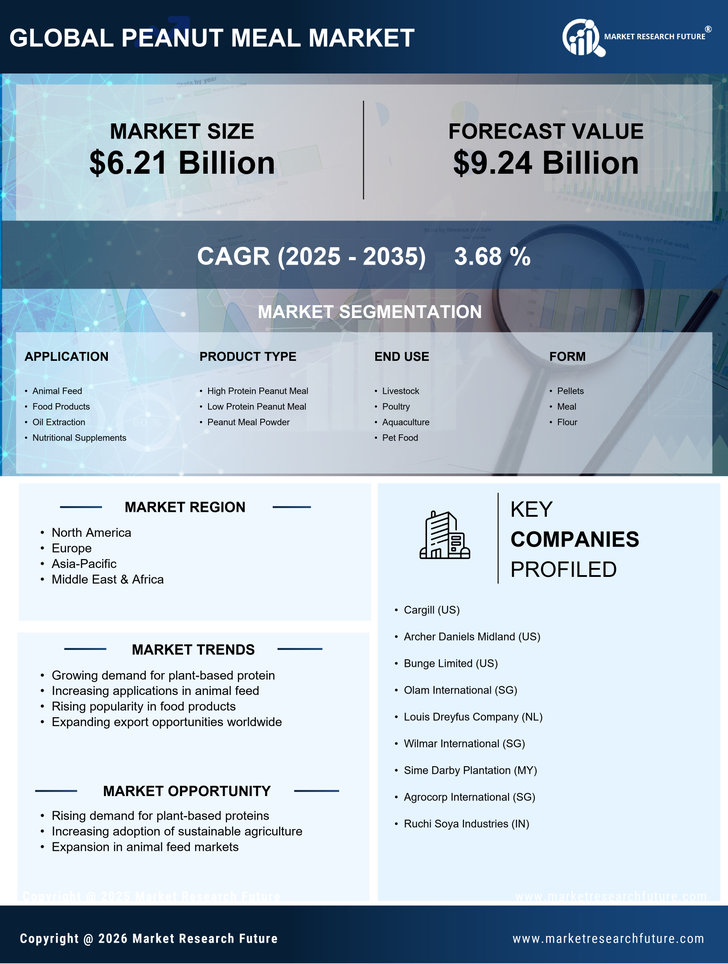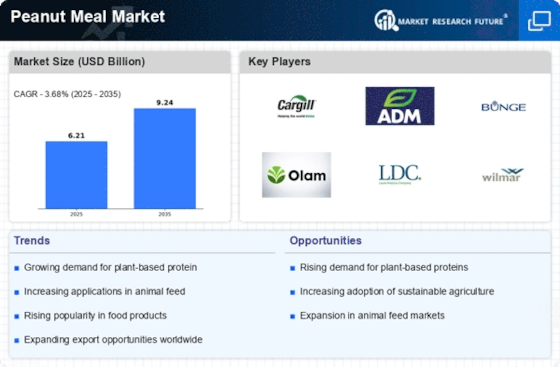Increasing Use in Animal Feed
The Peanut Meal Market is experiencing a notable surge in demand due to its increasing utilization in animal feed. Peanut meal is rich in protein and energy, making it an attractive ingredient for livestock and poultry diets. In recent years, the protein content of peanut meal has been reported to be around 45-50%, which is competitive with other protein sources. This high nutritional value is driving feed manufacturers to incorporate peanut meal into their formulations, thereby expanding its market presence. Furthermore, as the livestock sector continues to grow, the demand for cost-effective and nutritious feed ingredients is likely to increase, further bolstering the Peanut Meal Market. The trend towards sustainable and efficient animal husbandry practices also supports the use of peanut meal, as it is a byproduct of oil extraction, thus promoting resource efficiency.
Technological Advancements in Processing
The Peanut Meal Market is experiencing a transformation driven by technological advancements in processing techniques. Innovations in extraction and processing methods are enhancing the quality and functionality of peanut meal, making it more appealing to various sectors. For instance, advancements in solvent extraction and mechanical pressing are improving the efficiency of oil extraction, resulting in higher quality peanut meal with better nutritional profiles. These improvements are likely to attract food manufacturers and animal feed producers, as they seek high-quality ingredients that meet consumer demands. Furthermore, the development of new processing technologies may lead to the creation of specialized peanut meal products tailored for specific applications, thereby expanding the market potential. As these technological advancements continue to evolve, they are expected to play a crucial role in shaping the future of the Peanut Meal Market.
Expansion of Food Processing Applications
The Peanut Meal Market is witnessing an expansion in food processing applications, which is contributing to its growth. Peanut meal is increasingly being utilized in the production of various food products, including baked goods, sauces, and snacks. Its functional properties, such as emulsification and binding, make it an attractive ingredient for food manufacturers. The market for processed foods is on the rise, with consumers seeking convenient and nutritious options. As a result, the incorporation of peanut meal into processed food products is likely to increase, providing a dual benefit of enhancing nutritional value while catering to consumer demands for convenience. This trend is expected to drive innovation within the Peanut Meal Market, as manufacturers explore new formulations and applications that leverage the unique properties of peanut meal.
Rising Health Consciousness Among Consumers
The Peanut Meal Market is benefiting from a growing awareness of health and nutrition among consumers. As individuals increasingly seek out plant-based protein sources, peanut meal is emerging as a viable option due to its favorable amino acid profile and nutritional benefits. The market for plant-based proteins is projected to grow significantly, with peanut meal being positioned as a key ingredient in various health-focused products. This trend is further supported by the increasing popularity of vegetarian and vegan diets, which often emphasize the inclusion of diverse protein sources. Consequently, food manufacturers are exploring innovative ways to incorporate peanut meal into snacks, protein bars, and other health-oriented products, thereby enhancing its visibility and appeal in the Peanut Meal Market. This shift in consumer preferences is likely to drive sustained growth in the sector.
Sustainability and Environmental Considerations
The Peanut Meal Market is increasingly influenced by sustainability and environmental considerations. As consumers and businesses alike become more environmentally conscious, the demand for sustainable food sources is rising. Peanut meal, being a byproduct of peanut oil extraction, represents a resource-efficient option that minimizes waste. This aligns with the broader trend of reducing the carbon footprint associated with food production. Additionally, the cultivation of peanuts is often associated with lower water usage compared to other crops, further enhancing its appeal in the context of sustainable agriculture. As the food industry continues to prioritize sustainability, the Peanut Meal Market is likely to benefit from this shift, as manufacturers seek to incorporate more sustainable ingredients into their products, thereby appealing to eco-conscious consumers.


















